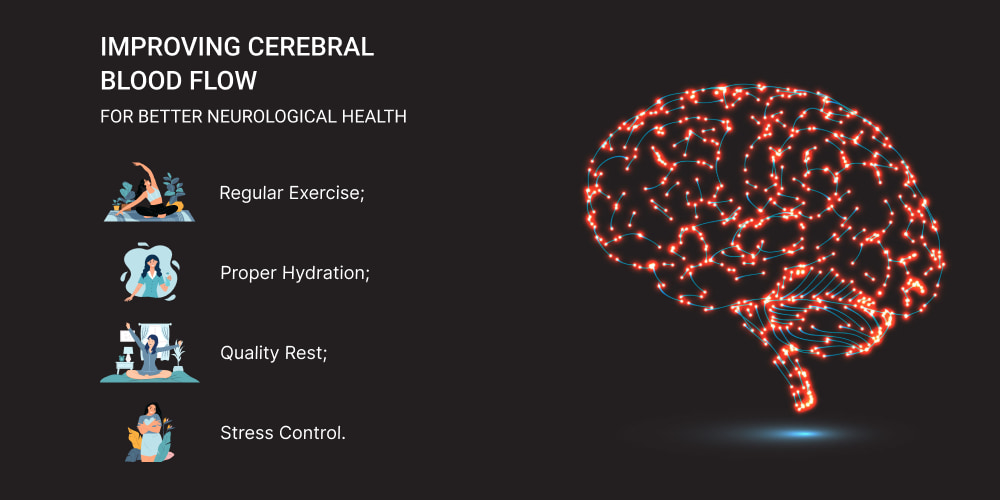The human brain, despite making up only about 2% of body weight, demands nearly 15% of the body’s total blood supply. This relentless need for oxygen (O2) and nutrients is met through cerebral blood flow (CBF). This intricate circulation system fuels all mental functions. It ranges from memory to problem-solving. Proper CBF ensures that neurons get essential resources while removing metabolic waste. It safeguards brain health and function.
However, disruptions in blood flow can lead to severe neural consequences. One of the conditions is ischemia (restricted blood supply), triggering strokes. Additionally, impaired neurovascular health is linked to neurodegenerative conditions such as Alzheimer’s.
The blood-brain barrier (BBB) plays a crucial role. It acts as a selective shield that regulates which substances enter the brain.
Understanding CBF is not just about circulation. It’s about:
- Preserving mental clarity
- Preventing disease
- Optimizing brain longevity
How Cerebral Blood Flow Supports Brain Function
Cerebral blood flow (CBF) is vital for maintaining brain function. It supplies O2, glucose, and other nutrients to neurons while removing waste products. Let’s examine how proper CBF contributes to health and the consequences of its disruption.
Oxygen and Nutrient Delivery:
- The brain relies on a steady flow of oxygen and glucose for energy production.
- Arteries like the carotid and vertebral arteries ensure blood reaches different regions.
- Neurons need continuous fuel to support functions like memory, reasoning, and motor control.
Waste Removal and Detoxification:
- The cerebral blood flow carries away carbon dioxide and metabolic waste. It prevents toxic buildup.
- The glymphatic system is active during sleep. It clears harmful proteins linked to neurodegenerative conditions.
Neurovascular Health and Cognitive Protection:
- Healthy blood vessels prevent cognitive decline by ensuring efficient circulation.
- A strong BBB regulates substances entering the brain, protecting against toxins.
- Proper CBF helps reduce the risk of neurodegenerative conditions (Alzheimer’s and Parkinson’s).
Consequences of Impaired Blood Flow:
- Ischemia can cause strokes and brain damage.
- Chronic poor circulation contributes to vascular dementia and mental impairment.
- Conditions like hypertension and atherosclerosis can weaken cerebral vessels. It increases the risk of aneurysms and hemorrhages.
Therefore, maintaining optimal CBF is crucial for neural health, mental longevity, and overall well-being.
The Impact of Poor Cerebral Blood Flow on Neurological Health
When CBF is compromised, the brain struggles to receive the O2 and nutrients it needs to function. This can lead to mental decline, neural conditions, and severe health complications. Here are the primary causes, consequences, and the importance of early intervention.
Common Causes of Reduced Cerebral Blood Flow:
- Ischemia – caused by blood clots or arterial blockages, leading to strokes.
- Atherosclerosis – the buildup of fatty plaques in arteries, restricting blood flow.
- Hypertension – damages blood vessels making circulation inefficient.
- Diabetes – can cause vascular damage, increasing the risk of poor circulation.
- Aneurysms & Hemorrhages – weakened blood vessels can rupture, reducing effective blood supply.
Cognitive Impairment and Neurodegenerative Diseases:
- Poor CBF is linked to vascular dementia. It’s a condition where reduced blood supply damages brain cells.
- Ailments (Alzheimer’s and Parkinson’s) are associated with impaired blood flow and reduced clearance of toxic proteins.
- Chronic hypoxia can lead to memory loss, confusion, and slower mental processing.
The Importance of Early Detection and Intervention:
- Brain imaging techniques (MRI, CT scans) can detect vascular abnormalities before symptoms worsen.
- Changes like exercise, a balanced diet, and blood pressure control boost circulation.
- Medical treatment, including blood thinners and vasodilators, can help restore proper blood flow.
Early intervention for poor CBF is crucial in preventing severe neural damage and ensuring long-term brain health and mental function. Addressing CBF issues promptly, we can reduce the risk of mental decline, dementia, and other conditions. This proactive approach not only preserves mental abilities. It also enhances overall quality of life. It allows individuals to maintain independence and mental sharpness as they age.
The Blood-Brain Barrier and Its Connection to Cerebral Circulation
The BBB is a crucial defense system that regulates (CBF) and protects the brain from harmful substances. When it’s compromised, it can lead to inflammation, impaired circulation, and neural conditions. Let’s take a closer look at its role and impact on brain health.
The Role of the BBB in Regulating CBF:
- The BBB is a selective filter made of endothelial cells that control what enters and exits the brain.
- It allows essential nutrients like O2 and glucose to pass through while blocking toxins and pathogens.
- Specialized transport systems regulate the flow of ions, amino acids, and neurotransmitters. It ensures stable brain function.
How a Compromised BBB Affects Neurological Health:
- Leaky BBB allows harmful substances to enter. It increases the risk of infections and inflammation.
- Reduced protection can lead to toxin accumulation. It contributes to mental impairment and neurodegeneration.
- Autoimmune responses may arise when immune cells mistakenly attack brain tissues.
Connections Between CBF, Inflammation, and Neurodegenerative Conditions:
- Poor cerebral blood flow leads to chronic inflammation. It damages cells over time.
- Alzheimer’s disease is linked to BBB breakdown. It allows toxic proteins like beta-amyloid to accumulate.
- Parkinson’s disease is usually associated with vascular dysfunction and inflammatory responses.
As a result, BBB is a highly selective membrane that protects the brain from harmful substances in the bloodstream. CBF is the blood supply to the brain. It’s essential for delivering O2 and nutrients. Maintaining BBB integrity and healthy CBF is crucial for preventing neural disorders including stroke, Alzheimer’s disease, and multiple sclerosis. These conditions can impair mental function, motor skills, and quality of life. By ensuring the proper functioning of the BBB and CBF, we can reduce the risk of these debilitating diseases and promote healthy brain aging.
Improving Cerebral Blood Flow for Better Neurological Health
Maintaining CBF is essential for brain function, mental health, and preventing neural conditions. A well-functioning circulation ensures that neurons receive O2 and nutrients and remove waste. Several lifestyle changes and interventions can enhance CBF and support brain longevity.
Healthy habits can naturally improve blood circulation. It reduces the risk of mental decline and neural conditions:
- Regular Exercise. Physical activity like walking, swimming, and strength training enhances circulation and O2 delivery. Aerobic exercises, like jogging and cycling, are particularly effective in stimulating blood flow.
- Proper Hydration. Dehydration can thicken the blood, making circulation less efficient. Drinking adequate water throughout the day helps maintain optimal blood viscosity. It reduces the risk of clot formation.
- Quality Sleep. The brain undergoes essential repair processes during deep sleep. The glymphatic system, active during sleep, clears toxins and metabolic waste. It supports overall brain function.
- Stress Control. Chronic stress leads to blood vessel constriction, reducing blood flow. Practices like meditation, yoga, and deep breathing exercises can promote relaxation.
A well-balanced diet plays a crucial role in promoting neurovascular health and preventing vascular-related mental decline:
- Omega-3 Fatty Acids. They’re found in fatty fish, flaxseeds, and walnuts. Omega-3s reduce inflammation and improve the elasticity of blood vessels, enhancing circulation.
- Leafy Greens & Berries. Rich in antioxidants and nitrates, foods like spinach, kale, and blueberries help dilate blood vessels. It improves overall blood flow.
- Dark Chocolate & Green Tea. They contain flavonoids that boost nitric oxide production. It leads to better circulation and mental performance.
When lifestyle changes are insufficient, medical interventions can help restore proper cerebral circulation:
- Blood Pressure Control. Uncontrolled hypertension can damage blood vessels. It leads to reduced blood flow and an increased risk of stroke. Regular monitoring and medication, if necessary, are crucial.
- Vasodilators & Antiplatelet Medications. These drugs help widen blood vessels and prevent clot formation in individuals at risk of ischemia.
- Hyperbaric Oxygen Therapy (HBOT). This advanced treatment involves breathing pure O2 in a pressurized chamber. It enhances O2 delivery to the brain. This treatment is often used in stroke recovery.
- When to Seek Medical Help. If experiencing frequent dizziness, memory problems, or stroke-like symptoms (sudden numbness, confusion, or vision loss), seeking medical attention is crucial for early intervention.
With these strategies, you can improve CBF, support neurological health, and reduce the risk of mental decline. Choosing the right healthcare provider for neurological health is a critical decision. We strive to be your trusted partner in this journey. We offer a patient-centered approach to neural care. We combine cutting-edge technology with compassionate, expert professionals. Our team comprises experienced neurologists, nurses, and support staff who are dedicated to providing personalized plans tailored to your specific needs.
We understand that neural conditions can be complex and impact every aspect of life. That’s why we focus on clear communication, ensuring you know your diagnosis, treatment, and outcomes.Beyond expertise, we invest in state-of-the-art facilities and diagnostic tools. It enables accurate and timely diagnosis. From advanced imaging to specialized therapies, we offer a full spectrum of services under one roof. We’re committed to staying at the forefront of advancements, updating our knowledge and techniques. Choosing us means choosing a dedicated team committed to your neurological health. Contact us today to schedule a consultation with our dedicated team. We’ll discuss your needs and explore tailored treatments to help you achieve your health goals.













Please, leave your review
Write a comment: